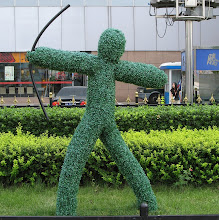
"...sensing to gather the relevant facts, intuition to see all measures that might usefully be taken, thinking to determine the consequences, and feeling to consider the impact of these consequences on the people involved. The pooling of their respective perceptions and judgments offers the best chance of finding a solution valid for them both."
"...Sensing types want the solution to be workable, thinkers want it systematic, feeling types want it humanly agreeable, and intuitives want a door left open for growth and improvement."
-- Gifts Differing
Myerses endorse Van der Hoop's description of the three stages of type developments. The first stage is the beginning of the differentiation of a prevailing process, be it sensing, intuition, thinking or feeling. At the second stage, the prevailing process dominates, and the rest processes are suppressed in order for the dominant process to reach its full development. For a few people, there is a last stage, in which previously suppressed processes are permitted to develop, thereby unfolding "a fuller and richer expression of human nature".
Van der Hoop's description of the three stages does not include the ages these stages occur. And I think for people like me who have already graduated from college, the last stage is where efforts should be, and that's where this post will focus on.
It is always enlightening, sometimes annoying, and every once in a while amusing and entertaining to see people act unconsciously according to their types. However, the last stage of type development requires CONSCIOUSLY exercising what people are not good at, and as Myerses put it "The recognition that one process is more appropriate than another in a given situation is an important milestone in type development." One not only needs to first see the difference among the four processes and realize the merits of each one of them, but also needs to be aware of which process he/she is using at a given time. For example, "Gosh, it is freezing cold out there" is a sensing perception, and "I'd better not to go outside" is a thinking judgment, and "Only if I had a car" is a intuitive perception, and "I'd better still go, otherwise my friends will keep waiting" is a feeling judgment.
In order to practice the less developed processes during the last stage of type development, Myerses suggest to use problems encountered in life to develop those skills. All the four processes have to be used, and have to be used in the following sequence, in order to arrive at a good solution.
"When confronted by a problem to solve, a decision to make, or a situation to deal with, try exercising one process at a time, consciously and purposefully, each in its own field, without interference from other processes, and in the following order:
Sensing to face the facts, to be realistic, to find exactly what the situation is and what is being done about it. Sensing can help you avoid wishful thinking or sentiment that may obscure the realities. To activate your sensing process, consider how the situation would look to a wise, impartial bystander.
Intuition to discover all the possibilities—all the ways in which you might change the situation, your approach, or other people’s attitudes. Try to put aside your natural assumption that you have been doing the obviously right thing.
Thinking to impersonally analyze cause and effect, including all the consequences of the alternative solutions, pleasant and unpleasant, those that weigh for and those that weigh against your preferred solution. Consider the full costs involved and examine misgivings you may have suppressed because of loyalty to someone, liking for something, or reluctance to change your stand.
Feeling to weigh how deeply you care about the things that will be gained or lost by each of the alternatives. In making a fresh appraisal, try not to let the temporary outweigh the permanent, however agreeable or disagreeable the immediate prospect may be. Consider as well other people’s feelings, reasonable and unreasonable, about the various outcomes, and include your feelings and theirs among the facts to be considering n deciding which solution will work best.
The final decision will have sounder basis than usual, because of your consideration of facts, possibilities, consequences, and human values. "
Though Myerses put the dynamics of type development at the end of the book, I move it ahead because this dynamic view of types opens the door to personal growth over a life time, thus preventing any deterministic misinterpretation.
